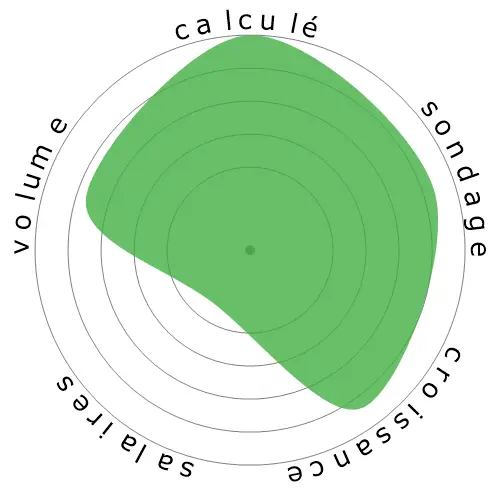Conseillers en santé mentale
Les données sur l'emploi ne sont pas spécifiquement disponibles pour cette profession auprès du Bureau des Statistiques du Travail, donc nous utilisons les données provenant de Substance Abuse, Behavioral Disorder, and Mental Health Counselors.




Les gens ont également vu
Risque d'automatisation calculé
Risque Minimal (0-20%) : Les professions dans cette catégorie ont une faible probabilité d'être automatisées, car elles exigent généralement une résolution complexe de problèmes, de la créativité, de solides compétences interpersonnelles et un haut degré de dextérité manuelle. Ces emplois impliquent souvent des mouvements de main complexes et une coordination précise, rendant difficile pour les machines de reproduire les tâches requises.
Plus d'informations sur ce que représente ce score et comment il est calculé sont disponibles ici.
Sondage utilisateur
Nos visiteurs ont voté qu'il y a peu de chances que cette profession soit automatisée. Cette évaluation est davantage soutenue par le niveau de risque d'automatisation calculé, qui estime 0,0% de chances d'automatisation.
Que pensez-vous du risque de l'automatisation?
Quelle est la probabilité que Conseillers en santé mentale soit remplacé par des robots ou l'intelligence artificielle dans les 20 prochaines années ?
Sentiment
Le graphique suivant est inclus chaque fois qu'il y a un nombre substantiel de votes pour rendre les données significatives. Ces représentations visuelles affichent les résultats des sondages utilisateurs au fil du temps, fournissant une indication significative des tendances de sentiment.
Sentiment au fil du temps (annuellement)
Croissance
On s'attend à ce que le nombre de postes vacants pour 'Substance Abuse, Behavioral Disorder, and Mental Health Counselors' augmente 18,8% d'ici 2033
Les prévisions mises à jour sont attendues 09-2025.
Salaires
En 2023, le salaire annuel médian pour 'Substance Abuse, Behavioral Disorder, and Mental Health Counselors' était de 53 710 $, soit 25 $ par heure.
'Substance Abuse, Behavioral Disorder, and Mental Health Counselors' ont été payés 11,8% de plus que le salaire médian national, qui était de 48 060 $
Volume
À partir de 2023, il y avait 397 880 personnes employées en tant que 'Substance Abuse, Behavioral Disorder, and Mental Health Counselors' aux États-Unis.
Cela représente environ 0,26% de la main-d'œuvre employée à travers le pays
Autrement dit, environ 1 personne sur 381 est employée en tant que 'Substance Abuse, Behavioral Disorder, and Mental Health Counselors'.
Description du poste
Conseiller et orienter les individus et les groupes pour promouvoir une santé mentale et émotionnelle optimale, avec un accent sur la prévention. Peut aider les individus à faire face à un large éventail de problèmes de santé mentale, tels que ceux associés aux addictions et à l'abus de substances ; aux problèmes familiaux, parentaux et conjugaux ; à la gestion du stress ; à l'estime de soi ; ou au vieillissement.
SOC Code: 21-1014.00


Commentaires
Leave a comment
The client also has unlimited access to a therapist that never gets fatigued or distracted. Plus, the client can have on-demand access 24/7/365, for 5 minutes or 5 hours.
Sadly, therapists will be rare, but fortunately, society will achieve greater mental health.
For people who want quick fixes, they may turn to AI for a while. But as symptoms return, they'll wise up.
What's worrisome is the monetization of AI for these purposes. Research into AI therapy is almost entirely unethical, largely because it will be used for profit, not for people - and we all know it.
By the time people realize AI therapists are a sham, insurance companies may have long abandoned reimbursement for human therapy. We'll be too busy doomscrolling or consuming YouTube videos of kittens to do anything about it.
Eventually, when the philosophical debate about what it means to be "conscious" and "alive" starts to include AI, then it will be very interesting. However, that is likely far away.
Laissez un commentaire sur cette profession